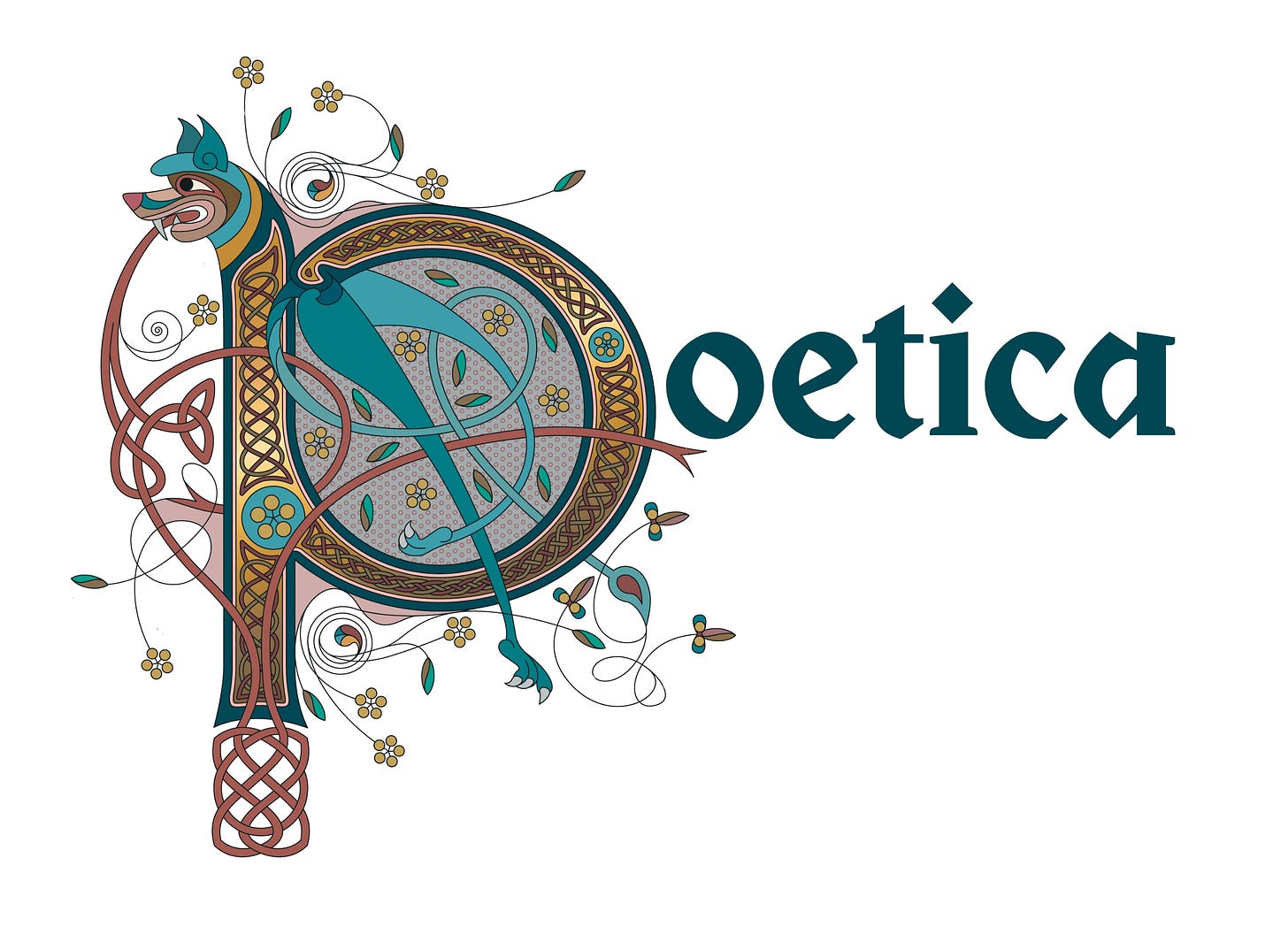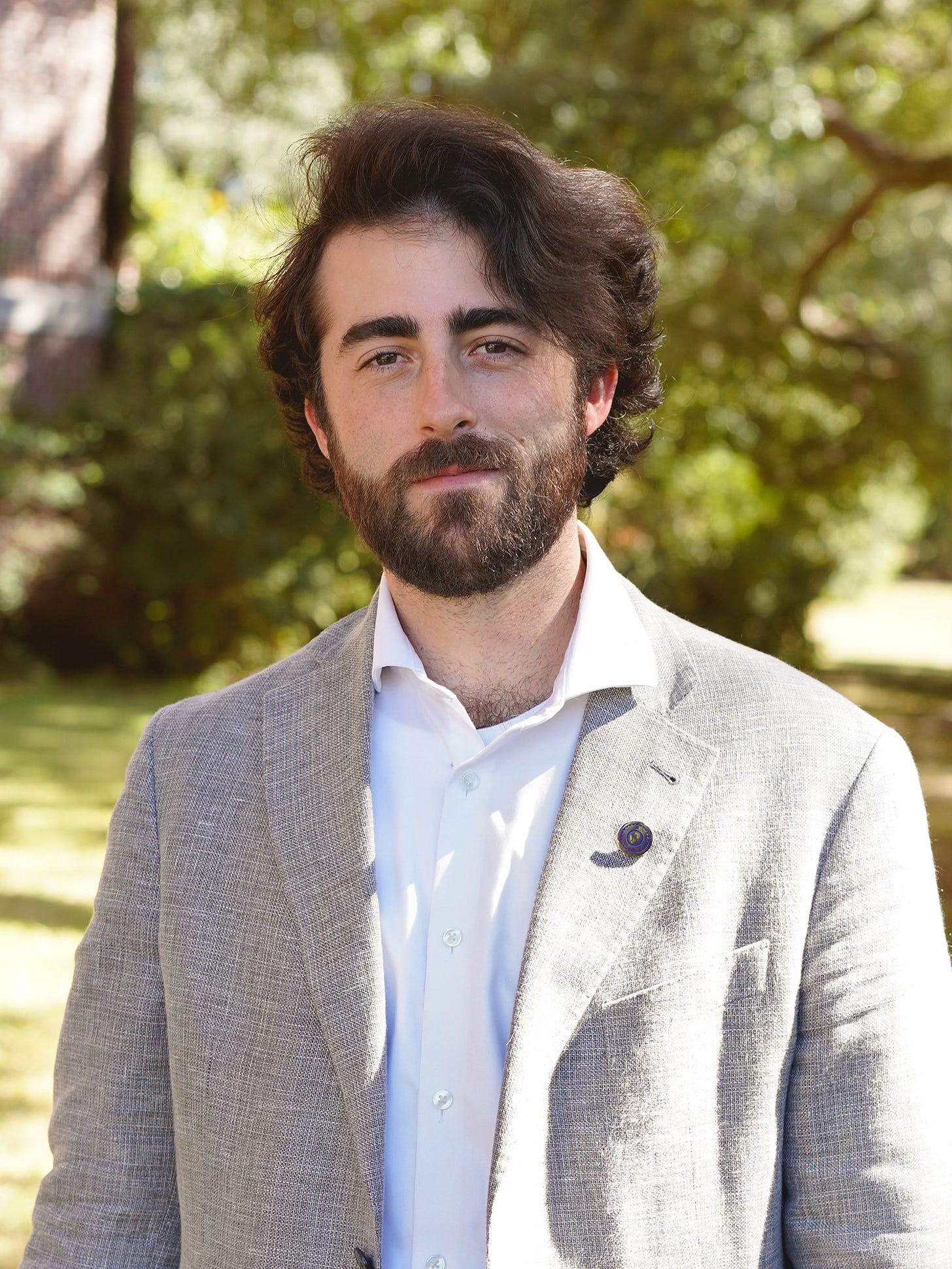Poetica: "Christchurch Meadow" by Daniel Fitzpatrick
Welcome to Poetica, the monthly poetry column of Shadowlands Dispatch! This month, Shadowlands Dispatch is pleased to present a poem by Daniel Fitzpatrick, “Christ Church Meadow,” followed by an interview with Editor-in-Chief Megan Rials. Fitzpatrick serves as Editor of Joie de Vivre, a journal of arts, culture, and letters for South Louisiana.
Christ Church Meadow
By Daniel Fitzpatrick
Around the meadow where the pheasants stirred
the yellow grass of summer, where a word
or two at intervals of hours meant
fresh continents of wonder as we bowed
our heads like flowers with the wind, we went
at arm’s length, dreaming monuments. Aloud
you simply spoke the willow and the swan,
the stream that coupled every image on
the black, stately mirror of its silence.
The red-ribbed cows appeared beyond the fence,
the swept grass breaking on them where they hulked
like wrecks of treasure ships in silhouette
against the gold cliffs of Christ Church, their bulk
submerged to gnaw our restlessness, to whet
that hunger for the hidden sun that gives
a mordant savor to the heart by which we live.
Shadowlands Dispatch Interview
Megan Rials: In addition to serving as Editor in Chief of Joie de Vivre, a Catholic literary journal for South Louisiana, you’re also an essayist, a novelist, a translator, and a high school English teacher. Tell us more about how your educational background shaped your wide-ranging interests, what you teach, and your prior work, especially what you’re most proud of and what you feel represents you best.
Daniel Fitzpatrick: My education began between books and the woods and water. I read somewhat indiscriminately, and I spent a lot of time outside, sometimes fishing with my dad but more frequently running around the neighborhood looking for rocks and feathers and seed pods. I thought for a long time that my education would progress more and more toward the scientific, especially the biological, and I did, throughout my time at the University of Dallas, take biology classes, but it was during my freshman year there that I discovered philosophy as a discipline and so took philosophically to literature.
After UD, while working a variety of jobs, I finished an MA in philosophy and an MPhil in Creative Writing. The two disciplines are constantly at work in my process, but nature remains prominent for me as well. Nature as point of departure for literary and philosophical pursuits can certainly be found in my first novel, Only the Lover Sings, and the same set of concerns is key to Dante’s Divine Comedy, which I translated several years ago.
My most recent publications are the poetry collection Yonder in the Sun and the philosophical study Restoring the Lord’s Day. Both represent about a decade of thinking and writing.
MR: Tell us about your development as a poet and a writer more broadly. What are your abiding themes and concerns?
DF: I initially sought to imitate T.S. Eliot, to write a kind of verse which asked a lot of the reader and didn’t necessarily offer the reader much help. I still maintain that that mode should be open to poets, but, especially through the influence of poets like Greg Pardlo, who I met at the Key West Literary Seminar in 2020, I came to seek a greater degree of generosity with my readers—and, perhaps, with myself.
MR: To which poets do you turn when you feel in need of inspiration, and whom would you recommend to Shadowlands Dispatch readers?
DF: Among my favorites are Yeats, Richard Wilbur, Greg Pardlo, Shakespeare, Dante, Howard Nemerov, and T.S. Eliot. It was Eliot’s poetry that first made me want seriously to be a poet, back in my high school years. The intellectual heft of his work opened me to the seriousness of poetry. I read him less frequently now, but his presence remains.
There are loads of others, of course. But I think if I had to pick one lyric poet to return to over and over again for depth of imagination and technical prowess, it would be Yeats.
MR: What about the actual location inspired “Christchurch Meadow”? Especially for our readers who haven’t visited Oxford, could you elaborate on the specifics of how it captivated your imagination and moved you to write this poem?
DF: I spent the summer studying at Oxford in 2011. On most days, after Mass at the Oratory, I would walk the Meadow. I loved the little red deer that gathered there and the pheasants and the cows that loomed up in the thick grass. I loved the stillness of the river and the golden Oxford skyline and the bells that rang out. In a summer of almost perfect peace, it was a place of still greater peacefulness.
MR: “Christchurch Meadow” has such a strong sense of place, featuring, as it does, the enchantment of Oxford. The main theme of Shadowlands Dispatch is seeking the re-enchantment of the world through the presence of Christ the Logos. You and I are both from South Louisiana, which shares in common with Oxford that uniqueness of place, although the two locations are of course completely different in their character! Thanks to globalization and the ease of travel and transportation, many areas of the modern world are rapidly and tragically losing this sense of local place and culture. As a South Louisianan and a poet, what role do you believe geographic place plays in re-enchantment, and how can we as Christians (and especially Christian writers) tap into it as part of God’s glorious reality pervading the world as part of the re-enchantment project?
DF: So much of the re-enchantment of the world demands allowing ourselves to be re-enchanted, a process that can take place in any number of ways but certainly does so by letting ourselves be taken up by Christ as revealed in the places we inhabit daily.
Being a poet, and a writer generally, has so much to do with looking through Christ-enchanted eyes.
MR: What are your other current projects, and when will be available? Where is the best place for our readers to find your work?
DF: My next novel, First Make Mad, is due out this year from Wipf & Stock. My books are available on Amazon.





